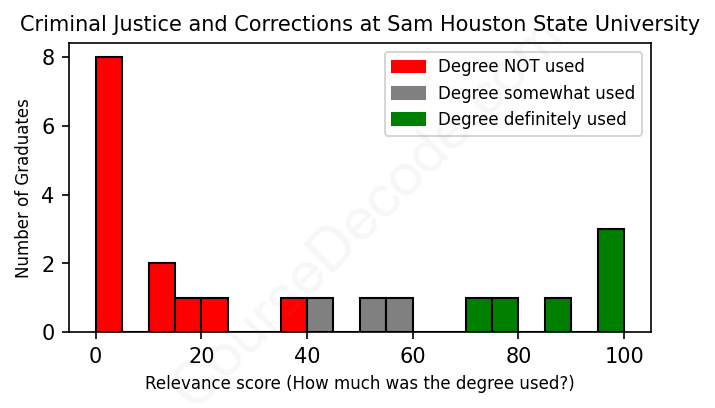
First, some facts. Of the Criminal Justice and Corrections graduates from Sam Houston State University we've analyzed , here's how many have used (or NOT used) their degree in their career:

These are estimates based on AI analysis of 22 LinkedIn profiles (see below).
The verdict? Horrible! Overall, with an average relevance score of 35%, Criminal Justice and Corrections graduates from Sam Houston State University have an exceptionally lower likelihood (-32%) of finding work in this field compared to the average graduate across all fields:
And for comparison, here's the chart for all profiles we've looked at across all degrees.
Also, after graduating, only 13% of these graduates have pursued further education other than another Bachelor's degree (such as a Masters degree or other), compared to the average across all profiles of 35%. This suggests a Bachelors degree is enough for most Criminal Justice and Corrections graduates, and it's normal to look for work straight after graduation.
See the details:
|
Relevance score: 10% We think this person has NOT gone into a career related to their degree. We think this person has NOT gone into a career related to their degree.
DEGREE INFOGraduated in 2020 from Sam Houston State University with a Bachelor of Science - BS in Criminal Justice and Corrections. No other secondary education since. JOB HISTORY SINCE GRADUATIONScale Operator Cranesville Block Co., Inc. Jun 2020 - Oct 2023 Store Manager  Les quipements d'rablire CDL inc. / CDL Sugaring Equipment inc. Oct 2023 - Present ABOUTNo information provided. |
The top 10 most common jobs done by the graduates we've analyzed (ranked most common to least) are:
Here is a visual representation of the most common words in job titles for Criminal Justice and Corrections graduates (this is across all Criminal Justice and Corrections graduates we've analyzed, not just those who went to Sam Houston State University):

Looking at the career trajectories of Sam Houston State University graduates with degrees in Criminal Justice and Corrections, it's clear that many have found their way into jobs that are fairly relevant to the field. Fresh graduates often start off in roles like case managers, public safety positions, or even as interns in legal settings, like the District Attorney’s Office. Those who graduated around 2010 often began in positions not directly related to criminal justice, but many eventually found their way into more relevant roles such as firefighters or case managers within the Texas Department of Criminal Justice. This suggests a common initial struggle to land straight into a job that perfectly aligns with their degree right after graduation.
Fast forward five to ten years later, and many graduates seem to have settled into solid career paths. People from the Class of 2014, for instance, appear to have moved up significantly within the Texas Department of Criminal Justice, showcasing a trend of advancing in public service roles. On the other hand, some graduates have taken winding paths that bring them to varied fields—even starting their own businesses or moving into areas like marketing and real estate. While it's clear that a good number have experienced substantial success and relevance to their degrees, there are also those who still find themselves in jobs that seem to diverge from the expected career outcomes associated with a Criminal Justice degree. Overall, there’s a mix of outcomes, with a noticeable number of graduates finding meaningful careers in and around criminal justice, service, and law enforcement roles over time, while others have branched out into unrelated fields, which highlights both the challenges and opportunities that come with this degree.
Getting a Bachelor’s degree in Criminal Justice and Corrections at Sam Houston State University is pretty manageable overall, especially if you’re interested in the subject. It's not the hardest degree out there—most of the courses are designed to give you a solid understanding of the criminal justice system, including some hands-on experiences and theoretical stuff. You’ll definitely have to put in some effort, especially if you want to ace your classes, but if you stay organized and don't procrastinate, things should go pretty smoothly. Like any degree, it has its challenges, but it’s definitely doable for most students who are willing to work for it.
Most commonly, in the LinkedIn profiles we've looked at, it takes people 4 years to finish a Bachelor degree in Criminal Justice and Corrections.
Looking at these SHSU Criminal Justice and Corrections grads, it seems like their earnings can vary quite a bit. The earlier graduates, like the firefighter and the taxes business owner, might not be raking in the big bucks compared to some newer roles, but they have stable careers. Meanwhile, those who moved into more specialized roles, especially in law like the associate attorney, likely pulled decent salaries right out of school. It seems like the paychecks are decent for most, especially with those involved in public service and law, but others in more entry-level positions may still be working their way up the ladder. Overall, it seems like a mixed bag where some are doing really well, while others might be just getting by!
Here is a visual representation of the most common words seen in the "about" section of LinkedIn profiles who have a Bachelor degree in Criminal Justice and Corrections (this is across all Criminal Justice and Corrections graduates we've analyzed, not just those who went to Sam Houston State University). This may or may not be useful:

Here are all colleges offering a Bachelor degree in Criminal Justice and Corrections (ordered by the average relevance score of their Criminal Justice and Corrections graduates, best to worst) where we have analyzed at least 10 of their graduates:
| College | Score | Count |
|---|---|---|
 American Military University American Military University
|
52 | 13 |
 Bridgewater State University Bridgewater State University
|
50 | 13 |
 University of Central Florida University of Central Florida
|
47 | 14 |
 University of North Texas University of North Texas
|
47 | 14 |
 University of Phoenix University of Phoenix
|
41 | 23 |
 University of Cincinnati University of Cincinnati
|
41 | 12 |
 Sam Houston State University Sam Houston State University
|
35 | 22 |
 John Jay College (CUNY) John Jay College (CUNY)
|
35 | 12 |
 Ferris State University Ferris State University
|
34 | 14 |
 Florida International University Florida International University
|
31 | 17 |
 Liberty University Liberty University
|
31 | 10 |
 California State University-Sacramento California State University-Sacramento
|
24 | 14 |
 Colorado Technical University Colorado Technical University
|
24 | 16 |